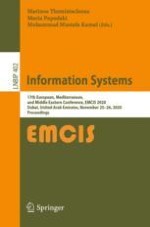2020 | OriginalPaper | Chapter
Game-Based Information Security/Privacy Education and Awareness: Theory and Practice
Authors : Stylianos Karagiannis, Thanos Papaioannou, Emmanouil Magkos, Aggeliki Tsohou
Published in: Information Systems
Publisher: Springer International Publishing
Activate our intelligent search to find suitable subject content or patents.
Select sections of text to find matching patents with Artificial Intelligence. powered by
Select sections of text to find additional relevant content using AI-assisted search. powered by
